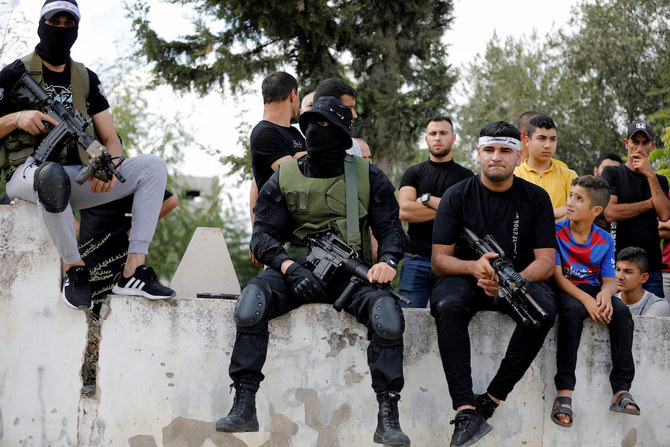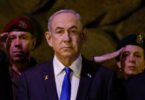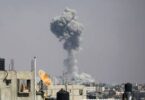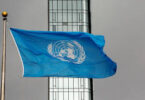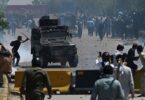Yossi Mekelberg
In his book “The Art of War,” the Chinese general and philosopher Sun Tzu remarked that “the enlightened ruler is heedful, and the good general full of caution.”
More than 2,500 years later, as the Israeli drums of war threaten to unleash a major military operation in the West Bank, it is increasingly apparent that the politicians in the country seem to be heedless and it is indeed the generals who are more circumspect, despite immense pressure from some of their political masters.
From the very beginning of the current Israeli government, there have been calls by the far-right elements within it for a large-scale, widespread military operation, especially in the northern West Bank. These calls are mainly from those who represent Israeli settlements, who not only illegally occupy Palestinian land but also now lead key government ministries.
To be sure, there has been a marked deterioration in the security situation in the West Bank, especially in and around the cities of Jenin and Nablus, which are once again emerging as the hubs of armed resistance to the occupation.
The writing has been on the wall for months, if not years, but Israel has adopted an extremely short-sighted strategy based on a working assumption that between its military might, security coordination with the Palestinian Authority, and the divisions among Palestinians, there is enough of a guarantee for its continued security within the Green Line, and for the security of the settlers in the Occupied Palestinian Territories.
This strategy represents nothing short of exercising a deliberate and willful ignorance, as all recent developments have been pointing toward a malaise and resentment that has been bubbling for some time, and is now close to the surface. A new generation of armed groups, mainly made up of young Palestinians, has emerged in the West Bank. They are not affiliated, at least not directly, with the more recognizable factions of the Palestine Liberation Organization or the Islamist movements Hamas and Islamic Jihad.
Newer groups, such as the Jenin Brigade and the Lions’ Den in Nablus, are the manifestation of a growing frustration among the young with the so-called status quo, whether in these cities or refugee camps, and hence they are resorting to militancy and armed resistance, including acts of terrorism.
While these groups are relatively small, each comprising a few hundred members at most, their impact is being felt across the West Bank. Their attacks on Israelis, whether soldiers or civilians, take place chiefly in the West Bank but also, much less often, inside Israel itself.
However, what Israel authorities refuse to recognize is that it is mainly the harsh conditions of the occupation, in addition to the crisis of legitimacy within the Palestinian Authority — which is perceived as no more than a facilitator of the Israeli occupation through its security cooperation and its corrupt, ineffective and increasingly authoritarian actions — that have created such fertile ground for political violence.
As long as there is Israeli military rule, the ongoing expansion of settlements in the West Bank with the clear aim of annexing it, and the lack of any prospect of fresh elections or unity within the Palestinian political system, there will not be any calm or stability in the West Bank or in Gaza.
Add to this the cuts to basic services and high levels of unemployment and poverty, while the UN Relief and Works Agency for Palestine Refugees in the Near East is on the verge of economic calamity, and it should be no surprise that despair among Palestinians has become endemic.
Violence against civilians is clearly not justifiable by either side. But for Israel to be able to claim the moral high ground in the face of Palestinian militancy, it needs not only to stop killing innocent Palestinians but also to refrain from all other oppressive measures against the population of the Occupied Palestinian Territories.
If one can learn anything from the wider history of military occupations, and resistance to them, it is that the most military force can achieve is a temporary lull, often at a very heavy price, especially to the civilian population.
In the long term, it solves nothing. It enrages, justifiably so, an already agitated population to the extent that more people become supporters, active or passive, of the armed struggle and others, mainly among the youth, are encouraged to join armed groups.
At present, Israeli security forces already conduct daily operations across the West Bank, particularly in centers of militancy such as Jenin and Nablus, where they do capture and kill some suspected militants. But more often they kill and maim innocent bystanders, and by doing so simply pour more oil onto the fire.
In a recent survey, more than half of Palestinians polled in the West Bank and Gaza expressed the belief that the most effective means of ending the Israeli occupation and gaining self-determination was to resort to armed struggle. Only one-fifth expressed a belief that this objective could be achieved through negotiation or popular peaceful resistance.
These findings should alarm every single Israeli, because after decades during which a majority of Palestinians held onto the hope that a two-state solution could be achieved through diplomatic means, that hope has turned to despair. A military operation will only exacerbate this explosive situation, rather than restoring faith in a political solution.
The pressure from the religious, ultra-nationalist elements in the Israeli government for a major military operation emanates from a delusion that such widespread action can guarantee the country’s security, combined with their desire for a full-blown, biblical confrontation they believe would ensure eternal Jewish control of the West Bank.
By exploiting Prime Minister Benjamin Netanyahu’s weakness in the face of the embarrassing evidence, being given daily during his corruption trial, about his and wife Sara’s unquenchable thirst for expensive presents from those with economic interests in Israel, far-right politicians are determined to hurriedly pursue their doomsday scenario while this freakish government still clings to power.
If the government continues to ignore the advice of its security forces that it avoid escalating the tenuous situation in the West Bank, it will only lead to more bloodshed on an even bigger scale and a situation in which many innocent people will be trapped, along with the possible outbreak of a full-fledged third intifada, the collapse of the Palestinian Authority, and the prospect of Hamas joining the fray from Gaza.
This is hardly a desirable scenario for anyone, including Israel, unless the current government is truly determined to press the destruct button not only on its democratic system, but also on its extremely fragile relations with Palestinians, large parts of the wider region, and the international community — and thus embroil itself in weeks, months, possibly years of bloodshed.

